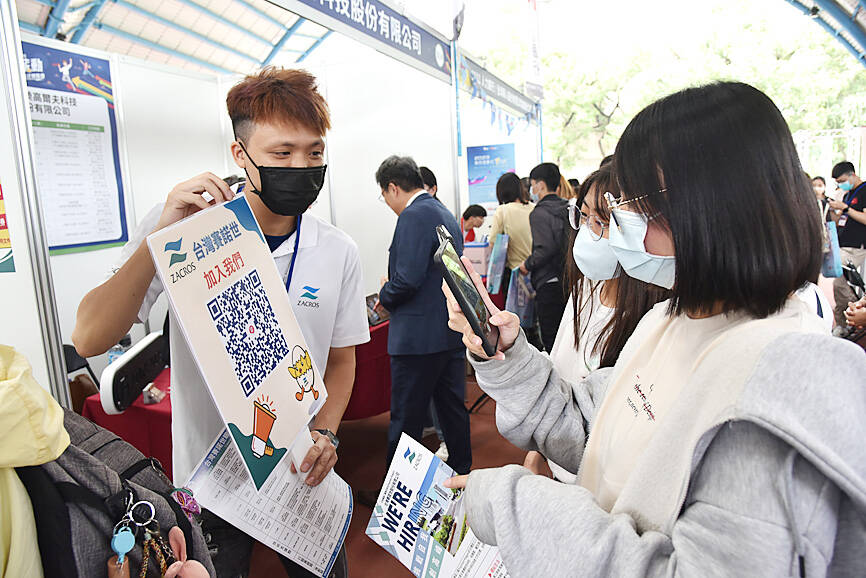Greater inclusion of middle-aged and older workers might be key to solving a serious worker shortage affecting several sectors, as society ages rapidly and many workers have postponed retirement for economic reasons, online human resource agency 104 Job Bank (104 人力銀行) said yesterday.
An unfavorable demographic trend further lends support to the hiring of middle-aged and older workers, 104 Job Bank said, citing inflation and Taiwan’s birthrate, which is the second-lowest in Asia, after Hong Kong.
“Taiwan’s labor shortage is intensifying with demand exceeding supply by 423,000 job openings,” it said, citing internal data.

Photo courtesy of National Pingtung University via CNA
The number of job openings has climbed to more than 1.04 million, and 181,000 of them welcome middle-aged and older candidates, it said.
The openings for senior job applicants soared threefold in the past three years, while interview invitations increased 2.3-fold to 327,000, it said.
Companies have increasingly turned to middle-aged and older candidates to fill vacant positions, it said.
The job bank welcomed the trend, saying that Taiwan’s labor participation rate among people aged 55 or older still lags behind Japan and South Korea.
The new pool of workers might help fill 26,000 openings in the wholesale and retail sectors, 10,000 vacancies at real-estate agencies and 8,000 openings in the hospitality industry as it emerges from the COVID-19 pandemic, 104 Job Bank middle-aged and senior employment division head Shelly Wu (吳麗雪) said.
Middle-aged and older workers are needed for jobs that require little team work, but lots of repetition and flexible hours, Wu said.
Financial considerations have prompted more than 80 percent of seniors to postpone retirement from age 61 to 64 so they can set aside more money, she said, adding that inflation has raised the retirement fund to NT$20 million (US$650,936) from NT$15 million.
The number of senior jobseekers rose to 58,000 last month from 47,000 monthly jobseekers three years ago, the job bank said.
However, the job market remains unfriendly to middle-aged and older jobseekers, as most companies prefer to hire young people, it said.
The time is not on the side of companies, as people aged 40 to 49 are to become the largest age bracket in the labor force, it said.

CAUTIOUS RECOVERY: While the manufacturing sector returned to growth amid the US-China trade truce, firms remain wary as uncertainty clouds the outlook, the CIER said The local manufacturing sector returned to expansion last month, as the official purchasing managers’ index (PMI) rose 2.1 points to 51.0, driven by a temporary easing in US-China trade tensions, the Chung-Hua Institution for Economic Research (CIER, 中華經濟研究院) said yesterday. The PMI gauges the health of the manufacturing industry, with readings above 50 indicating expansion and those below 50 signaling contraction. “Firms are not as pessimistic as they were in April, but they remain far from optimistic,” CIER president Lien Hsien-ming (連賢明) said at a news conference. The full impact of US tariff decisions is unlikely to become clear until later this month

Popular vape brands such as Geek Bar might get more expensive in the US — if you can find them at all. Shipments of vapes from China to the US ground to a near halt last month from a year ago, official data showed, hit by US President Donald Trump’s tariffs and a crackdown on unauthorized e-cigarettes in the world’s biggest market for smoking alternatives. That includes Geek Bar, a brand of flavored vapes that is not authorized to sell in the US, but which had been widely available due to porous import controls. One retailer, who asked not to be named, because

CHIP DUTIES: TSMC said it voiced its concerns to Washington about tariffs, telling the US commerce department that it wants ‘fair treatment’ to protect its competitiveness Taiwan Semiconductor Manufacturing Co (TSMC, 台積電) yesterday reiterated robust business prospects for this year as strong artificial intelligence (AI) chip demand from Nvidia Corp and other customers would absorb the impacts of US tariffs. “The impact of tariffs would be indirect, as the custom tax is the importers’ responsibility, not the exporters,” TSMC chairman and chief executive officer C.C. Wei (魏哲家) said at the chipmaker’s annual shareholders’ meeting in Hsinchu City. TSMC’s business could be affected if people become reluctant to buy electronics due to inflated prices, Wei said. In addition, the chipmaker has voiced its concern to the US Department of Commerce

STILL LOADED: Last year’s richest person, Quanta Computer Inc chairman Barry Lam, dropped to second place despite an 8 percent increase in his wealth to US$12.6 billion Staff writer, with CNA Daniel Tsai (蔡明忠) and Richard Tsai (蔡明興), the brothers who run Fubon Group (富邦集團), topped the Forbes list of Taiwan’s 50 richest people this year, released on Wednesday in New York. The magazine said that a stronger New Taiwan dollar pushed the combined wealth of Taiwan’s 50 richest people up 13 percent, from US$174 billion to US$197 billion, with 36 of the people on the list seeing their wealth increase. That came as Taiwan’s economy grew 4.6 percent last year, its fastest pace in three years, driven by the strong performance of the semiconductor industry, the magazine said. The Tsai